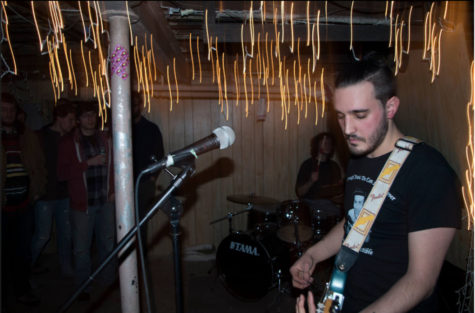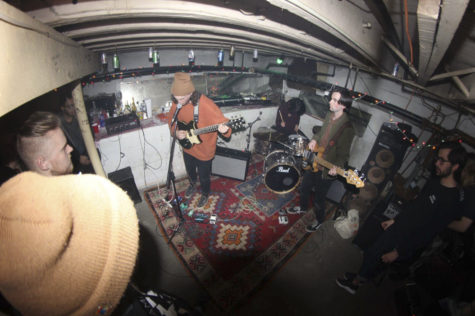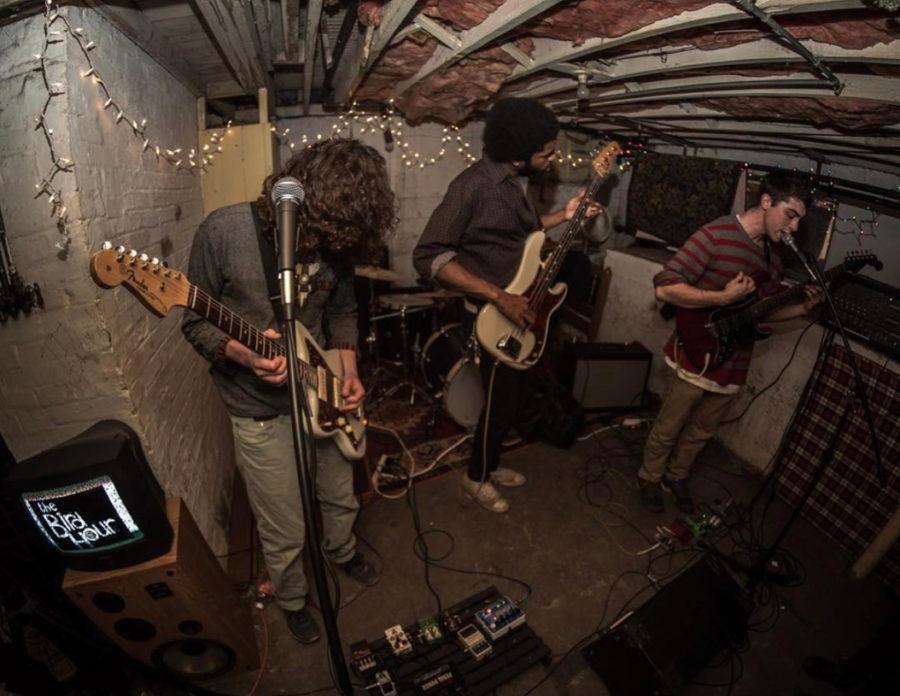On weekend nights and weekday evenings, musicians across the city set up their instruments and step up to the microphone, flanked by eager crowds of modern groupies and casual fans.
But a growing number of students and Oakland residents are skipping concerts at Stage AE and the Petersen Events Center in favor of something a little more familiar — like a friend of a friend’s South Oakland basement.
Underground and away from high-profile events, the never-dormant Pittsburgh DIY music scene comes to life. Bands active in this culture play shows in the basements of students’ houses, away from the red tape of the music business that takes the form of sponsorships and the pressure of potentially performing in front of label executives. Freer spaces foster a sense of community and belonging, performers and fans say. Showrunners take a more hands-on approach to their music selection, opening their houses to friends, acquaintances and sometimes strangers in the name of a good time.
The foundation of the shows is inherently Do-It-Yourself — a movement grown out of the 1970s punk scene. DIY is the deliberate act of moving away from the music business, in favor of simply inviting bands to play in a shared space.
The house show subculture didn’t spring out of an animosity for larger venues, DIY insiders say, but out of a desire to offer more direct and individualized experiences for both touring acts and local talent that may not score a slot in a larger setting.
Similar to the larger shows they’ve stepped away from, musicians in the scene sell CDs, cassette tapes and clothing, which they either ordered or made themselves. But unlike the big-name events, promotion is done exclusively through social media, text messaging and word of mouth, straying from public advertising both in fear of attracting negative attention and to help maintain a carefully cultivated aesthetic shared by fans.
With Christmas lights adorning the ceilings, custom-painted backdrops behind the playing area and no real stage to speak of, house venues have to have just the right “feel.”
The Legend of Bates Hardcore Gym
Across the Boulevard of the Allies and nestled into a rivet off of Bates Street is Bates Hardcore Gym, a former house venue. Previously run in part by Anthony Resch — a senior fiction writing major who currently performs as the indie artist Royal Haunts — Bates Hardcore Gym holds a certain mystique in the Oakland house venue community, despite its short life span. Resch opened the venue in summer 2014 and closed its doors in October the next year.
“I’d say the vibe was the beginning of what eventually started getting called ‘soft grunge,’” Resch said. “Essentially it was a crossroads of garage indie rock and pop … hardcore emo and straight-up punk. I think the most important vibe was that of generosity and care. Most people who came knew we were trying to cultivate a space where anyone could feel comfortable.”
According to Resch, this “crossroads” of musical styles tapped into and expanded on the existing punk music scene in Pittsburgh.

In addition to local acts, touring acts including The Sea Life from Washington, D.C., and Sleeping Weather from Denver found themselves playing to Oakland crowds at Bates Hardcore Gym. Resch said the venue’s popularity had something to do with the established venues in Pittsburgh — such as Club Cafe, the Smiling Moose and Mr. Smalls — and the need for less restrictive music outlets.
“We got a lot of bands … that were associated with the music outside of houses, who were playing in clubs and dealing with promoters and dealing with age restrictions and dealing with a bunch of the other conflicting factors of playing music live,” Resch said. “We created a space that allowed for people who wanted to escape that, but still play shows.”
But nothing lasts forever. The members of the Bates’ household lined up a show that would be their biggest yet in October 2015. Five hundred Facebook RSVPs later, the law intervened.
“[The police] said, ‘Hey, we know about this. You can’t have that many people in this house. We’re going to drive by that day, so don’t even try,’” Resch said. “It got too big. There was too big of a thing, it couldn’t manage itself.”
Looking at the house venue culture now, post-Bates Hardcore Gym, Resch said it isn’t what it used to be — not positive or negative, just different.
Resch said much of the DIY music scene is subjective and up to interpretation. In his view, while the vibrancy of the scene has remained unchanged, there’s been an upswing in the sheer number of bands and variety of music styles playing at house shows. House venues are no longer just about the punk-inspired style that Resch’s venue specialized in.
“The definition of what a house venue is has changed a little bit. The potency, not as much,” he said. “But the diversity and the scope [is now] much wider.”
As both a former showrunner and a current house show musician, Resch sees the house show culture as more than just basement parties.
“I kind of view house venues as testing grounds,” Resch said. “I’ll get a little looser if I have different performance techniques that I want to try out. If it doesn’t sound exactly the way you want it to sound, you can revise it later.”
The stress of owning and operating a venue from your own is compounded by worries about disruption, Resch said — complaints from neighbors about the crowds or the noise. Bates Hardcore Gym didn’t have to worry about this as much because of its location, which was isolated in comparison to the row houses with shared walls that comprise most of Oakland and South Oakland housing.
“You can’t be a communal space if you’re going to disrupt your community,” Resch said.
Cranked High on the Down Low: An Oakland House Venue Flourishes
In North Oakland, a recently established house venue, has quickly become a staple in the local indie and DIY music scenes. Due to the showrunner’s desire to maintain a relative sense of privacy, The Pitt News is not naming the venue or its address.
The basement seems to exist for the purposes of live music. As you walk down the stairwell that runs down the center of the basement, you’ll see the playing area on one side and a place for bands to congregate — to sell merchandise or to relax after playing — on the other.
There is no indication of any lull in activity on a packed Friday night at Lewis’s house in mid-February. The crowd is rowdy and dancing to each act on the bill, which that night included local musicians Skull Kid, Jack Swing, Short Fictions, Surf Bored and Amir Miles.
Each band in turn takes the “stage” on a red and blue patterned rug level with the rest of the basement floor. Those who tire of the music head upstairs to the living room for a quieter evening more removed from the speakers.

The crowd members — friends of the musicians, newcomers and veterans of the scene — stand directly in front of the band dance and sweat to the music, while the rest stand and observe the action from a slight distance, lighting their friends’ cigarettes or taking pulls from flasks.
On a packed night, there’s little room to move. Despite this, the spot seems to have only grown in popularity since its inception in November 2016.
Lewis, a senior film studies and business double major who asked not to use his full name for privacy reasons, started the venue after attending shows at other similar spaces. But he noticed a disturbing reality.
“I’ve been probably inspired by the lack of house venues [in Oakland],” he said, noting that the Gym was once the “staple house venue” in the area.
In the period following its shutdown, activity around house venues softened and slowed, leaving an obvious gap in the market. That’s where Lewis and his relatively new venue came in.
He said he has seen a rebirth in the house show movement this year.
“I think [the scene] is picking up speed,” Lewis said. “There could always be more [house venues] because there’s plenty of bands that want to play that can’t.”
Since the only rules in a house are the ones established by the showrunner, any combination of bands can appear on the bill. Along with the usual DIY punk and indie offerings, Lewis’ house has been “groundbreaking” for hosting hip-hop artists — atypical for other Oakland house venues.
“I’d say it was to make music more of a community. That was the goal,” he said of his house shows. “I wanted to supply a venue where you would actually get good turnouts, where people would actually get what they needed and also have a good time.”
The Quiet Magic of FoundSound
Kyle Henson’s Shadyside apartment can be described many ways, but chief among these is not “great for live music.”
Chairs and couches barricade the playing area in the living room, along the same wall that holds Henson’s vinyl record collection. The musicians themselves sometimes stand no more than a foot away from excited members of the sizable crowd gathered, including some who have to stand in the kitchen or on the stairs behind the living room.
FoundSound is a live music curation organization that also hosts media content in the form of articles and videos featuring local artists. Starting in April 2015, founders Henson and Sam Ward, along with videographer Sam Suter, began to release videos of bands playing acoustic tracks in his living room. Since then, the organization has graduated to hosting entire bands in the same space, often featuring the artists who were previously featured in the videos.
FoundSound also organizes small concerts. While it currently focuses on local acts, it didn’t start out that way.
“FoundSound started off as trying to be a legitimate business,” Henson said. “I sort of come from a start-up background myself, and FoundSound was going to be the next start-up that paid the bills and became a national business.”
While the living room shows are related to FoundSound, Henson hesitates to call his apartment a “house venue.”
“FoundSound is more of an organization and I throw shows in my apartment sometimes for FoundSound,” Henson said. “But I don’t really run it as a venue and try to book it.”
Henson also doesn’t call his apartment a “house venue” because he doesn’t consider himself a member of that culture.
“I think FoundSound is probably different because my impression of house concerts is usually sort of more on the underground hardcore hard rock and we stick to pretty acoustic,” Henson said. “Because we’re on a third-floor apartment rather than the basement of a house.”
That’s not to say, however, Henson doesn’t take notes of what he sees when he attends events around the city.
“I think there’s excellent community. Everyone wants to help everybody out and everyone’s really nice,” Henson said. “I feel like everyone really just wants to do what they can to help other musicians, and it’s a great atmosphere to be a part of. It’s definitely a big part of what I’m going for, for sure.”


